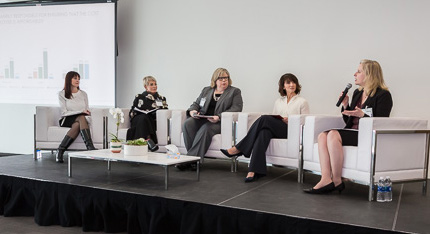
For many employers, the second biggest line item in their budgets is to pay for medical benefits for their employees. In fact, employers pay for the health care of more than half of all Americans. The value they get in return for that investment, however, is not always clear.
Patients too often make blind choices about their health care without knowing their costs or understanding the quality of care provided. And that has to change, said Shannon Connor Phillips, chief patient experience officer at Intermountain Healthcare. “Health care may be the only place where people come in and purchase something without understanding what they’ve bought. How is that acceptable?”
Phillips was one of more than 170 health care professionals, community members, government officials and business leaders who gathered at the Utah Value Forum to discuss what high-value care means to different stakeholders and how we can ensure we provide high-quality, patient-centered, affordable care.

For too long we’ve attempted to define value in health care without listening to those who receive, provide and pay for it, said University of Utah Health Interim CEO Lorris Betz. The Forum followed U of U Health’s nationwide survey that asked patients, physicians and employers how they perceived value in health care and prioritized its component parts—cost, quality and service.
Moving toward a more value-centric health care system is the only way forward, said Mike Leavitt, former Utah governor and former Secretary of the U.S. Department of Health and Human Services. But we can’t keep moving like a glacier when the forces behind the glacier are moving so rapidly. We need to face the crisis.

AFFORDABLE COSTS
Each of the Forum’s three panels—patients, physicians and employers—addressed the issues around cost and affordability—a top priority to patients in Utah and across the nation according to the survey. “It’s clear there is tension between health care quality and cost,” said Mary Jane Pennington, pediatrician and president of Granger Medical Clinic. “How do we reconcile that? How do we convey to patients that they have an advocate on the cost front as well as on the health front?”
Empowering and enabling physicians and patients to have discussions about the costs of care is an important step forward, said Donna Milavetz, founder and CEO of Onsite Care. “Physicians must start pushing hard on this. We need to be advocates for patients on health care costs.”
I believe the state of Utah can be a leader for the nation. But it’s going to take all of us to come together to chart the path forward, finding ways to transcend our individual agendas and work toward the collective good.
—Lorris Betz, Interim CEO, University of Utah Health

PATIENT EXPERIENCE
Beyond cost, access to health care and convenience are top concerns for patients, said Mari Ransco, director of patient experience at U of U Health. “Quality is also defined as convenience, times, location, the entire experience at appointments.”
“Consumers now expect the Amazon experience for everything,” said Mark Briesacher, chief physician executive and president at Intermountain Medical Group. “As physicians, we need to recognize that the experience—convenience, efficiency, service—is a high priority for patients.”
Convenience is also a high priority for employers who want to keep their employees healthy and at work. “It’s a pain and so time-consuming to go to a doctor,” said Susan Johnson, former president of Futura Industries. Her solution was to build an onsite clinic. O.C. Tanner is also headed in that direction. “Employees were wary when we started it,” said Johnson. “But now the clinic is the biggest job-satisfier in the whole organization.”
NEXT STEPS
Reimagining health care is not for the faint-hearted and the path is not well-marked, admitted Betz. “But what brings us together, I believe, is our shared commitment, and deep sense of responsibility, to make health better. The health of people throughout this community is hanging in the balance. They are depending on us to figure this out.”
PHOTO GALLERY
SIGN UP TO RECEIVE VALUE IN HEALTH CARE SURVEY RESULTS